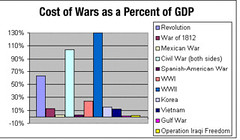 Over at NRO, they've got a colorful chart up proving that "Iraq War Not Breaking the Bank." Did you know the Iraq War may be the bargain of all American wars to date?!
Over at NRO, they've got a colorful chart up proving that "Iraq War Not Breaking the Bank." Did you know the Iraq War may be the bargain of all American wars to date?! Critics of the war in Iraq often complain about the “escalating cost of the war.” Listening to them, you’d never know that the war is one of the least expensive in American history.Well, after reading Jerry Bowyer's brief article and analyzing his Buzzchart, you won't really know, but you can believe it (clap for Tinkerbell) if you want to.
Robert Whaples, professor of economics at Wake Forest University, has measured the cost of each major American war up through the first Gulf War. We took these costs and compared them to the cost of the Iraq war and found that the Iraq experience has consumed a smaller percentage of GDP (just 2 percent of one year’s wealth creation) than every other American war except the first Gulf War (which measured just 1 percent of GDP).Any reasonably intelligent and sufficiently skeptical adult should come up with at least a half dozen questions regarding just that paragraph.
My 1st question: Where's the damn link to Whaples' work — this is National Review Online, you know.
My 2nd question: Whose data are you using and why?
My 3rd, 4th, and 5th questions: Is your cost figure for the Iraq War based simply on the aggregate dollar amount of the emergency supplementals passed to date? Does it factor in the debt service involved in actually paying off these supplementals? Does it include expenses projected into the future, such as those for medical care and rehabilitation for wounded vets?
My 6th, 7th, 8th, and 9th questions: What year (and why was that year selected) are you referring to when you say that "the Iraq experience has consumed a smaller percentage of GDP (just 2 percent of one year’s wealth creation)." Do GDP data consistently refer to nominal or real GDPs? And is it acceptable to use "wealth creation" and GDP interchangeably?
My 10th question: Other than NRO readers, who do you think you're fooling?



No comments:
Post a Comment